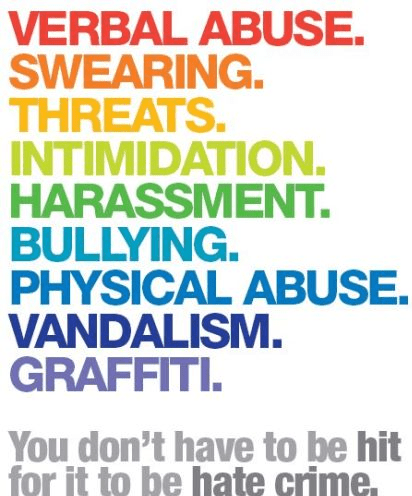The report comes the same day that the Home Office releases figures detailing an alarming increase in anti-LGBT hate.
Transphobic hate crime increased by 37% last year. Sexual orientation rose by 25%. Meanwhile, disability rose by 14%, race by 11% and religious hate by 3%.
The figures cover the increase in recorded hate crime between 2017/18 and 2018/19.
Concerning proportions of negative views
Whilst the majority of people polled were supportive of LGBT+ equality, the results revealed concerning proportions of negative views:
- 1 in 10 people thought that LGBT+ people were ‘dangerous’ to other people.
- 1 in 10 people said that being LGBT+ could be ‘cured’.
- 1 in 5 people said being LGBT+ was ‘immoral or against their beliefs’. This rose to 1 in 4 among 18-24 year olds, higher than other age groups.
- Around 3 in 5 people responded very positively about having LGBT+ people as neighbours. 1 in 5 people showed reluctance to the idea of LGB+ neighbours, and more than 1 in 4 to trans neighbours.
- 1 in 2 people agreed that hate crime has higher impact than other types of crime, and that LGBT+ people modify their behaviour in public to avoid being targeted.
- However, only 4 in 10 thought that violence against LGBT+ people is a problem in the UK
The polling was based on a representative sample of 1,617 people from across the UK.
Nick Antjoule, Galop’s Head of Hate Crime Services said:
We’ve seen a stark increase in the severity and scale of anti-LGBT violence and abuse over the past few years. This appears to be a symptom of emergent anti-LGBT attitudes and social division across society.
The fact that anti-LGBT hate crime figures are rising so much faster than race, faith and disability hate crime should be a wake up call for policy makers. We urge action now to address this problem before it escalates further.
Our research shows the journey toward LGBT+ equality is far from over. Despite most people in this UK poll voicing support for LGBT+ people; a significant proportion still think we are dangerous, immoral or that we can be ‘cured’.It offers a sobering reminder that progress achieved in recent decades can easily be reversed. Young people polled tended to hold more negative views toward LGBT+ people than other age groups. This alarming finding warns of a generational pivot ahead and a bumpy road for those of us committed to challenging anti-LGBT violence and abuse.
